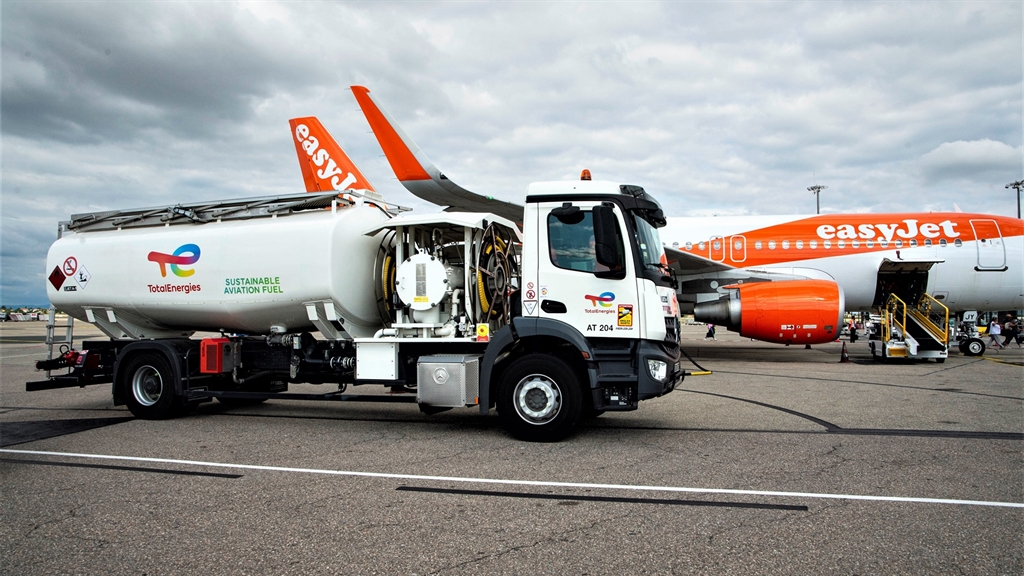easyJet showcases suite of innovative sustainability measures at Connecting Europe Days

- easyJet is putting the Single European Sky into action, reducing carbon emissions thanks to direct, optimised flight routings
- The airline will uplift a 30% blend of Sustainable Aviation Fuel (SAF) on three of its flights from Lyon airport, reducing each flight’s emissions by 27%*
- A number of crew will wear uniforms made from recycled plastic bottles, which will also be on display
- One of easyJet’s pilots, who is also doing a PhD focussing on sustainability and technological innovation in aviation, will participate in a Youth Panel debate
easyJet will be participating in the Connecting Europe Days 2022 in Lyon, a special event aimed at bringing together politicians, industry representatives and the European Commission to discuss transport and mobility, and their role in achieving the ambitious goals set out in the European Green Deal and the Sustainable and Smart Mobility Strategy. The “Connecting Europe by Air – the Green Transformation” event is part of the Connecting Europe Days, showcasing all the efforts the aviation industry is undertaking to become more sustainable and also highlighting what is needed from policymakers to support the net-zero transition. It is taking place on 28 June at Lyon-Saint Exupéry Airport Terminal 2.
easyJet is pleased to be taking part in this special event, demonstrating its continued commitment to sustainability and showcasing a number of innovative measures to reduce its carbon emissions from flying.
In collaboration with the Single European Sky’s ATM Research (SESAR)’s ALBATROSS project, the airline’s flight from Lisbon to Lyon will follow a specifically designed, optimised flight plan to showcase the potential for significant CO2 savings, if the Single European Sky was implemented.
Three of easyJet’s flights departing from Lyon airport will be uplifting a 30% blend of sustainable aviation fuel (SAF), produced and supplied by TotalEnergies, reducing emissions from each of these flights by 27% compared to using conventional jet fuel. Media will be able to watch the refuelling of flight EJU4339 to Toulouse.
Each of easyJet’s flights is already 100% offset, at no additional cost to customers, and the airline only invests in projects that are certified by Gold Standard or the Verified Carbon Standard, internationally recognised certification schemes. The airline operates its modern fleet of aircraft efficiently and aims to fill most of its seats, thus reducing CO2 emissions per passenger.
Last year, easyJet joined Race to Zero, the global UN-backed campaign to achieve net-zero carbon emissions by 2050, and has recently published its carbon emissions intensity improvement target of 35% by 2035. Ultimately, it is easyJet’s ambition to fly on zero carbon emission aircraft and the airline is working with several partners across the industry, including Airbus, Rolls-Royce, GKN Aerospace, Cranfield Aerospace Solutions and Wright Electric, to accelerate the development of zero carbon emission aircraft technology and the required infrastructure.
Sustainability is a holistic issue, so in addition to directly addressing carbon emissions from flying, easyJet is also mitigating the broader environmental impact from its operations. The airline has eliminated more than 36 million single-use plastic items used on its flights and also introduced new crew uniforms made from recycled plastic bottles. Forty-five bottles go into each uniform – with the potential to prevent 2.7 million plastic bottles from ending up in landfill or in oceans over the next five years. The garments are fashioned from a high-tech material that is made using renewable energy sources. A number of crew will be wearing these uniforms on flights throughout the day, the uniforms will also be on display at A4E’s Destination 2050 stand.
As 2022 is the European Year of Youth, the event will have a specific focus on young voices and views. Italian easyJet pilot Diego Babuder will participate in a Youth Panel, discussing experiences of being a young person in aviation. In addition to his flying duties, Diego is undertaking a four-year research project, jointly launched by easyJet and the Politecnico di Milano university, in one of the first PhDs in Europe focussing on the sustainability of air transport and looking into the challenges and opportunities presented by technological innovation in this area.
Thomas Haagensen, Director Group Markets and Marketing, who also oversees sustainability at Board level and is representing the easyJet management at this event, said:
“Today’s event brings together all the key stakeholders in our sector in our shared commitment to decarbonise aviation.
easyJet has committed to net-zero by 2050 when we joined Race to Zero last year. We also recently published our “35% by 2035” interim target. In order to reach this, different elements will play a role and some were showcased on our flights today: we need airspace modernisation, our SESAR-optimised flight showed what is possible; and we require affordable SAF at scale, the carbon savings benefits were demonstrated on three of our flights today.
In the longer term, we believe that aviation needs to make radical changes and championing the development of a zero carbon emission aircraft to decarbonise aviation is a focus for easyJet. We have partnered with Airbus, Rolls-Royce, Cranfield Aerospace Solutions, GKN Aerospace and others to accelerate the development of zero carbon emission technologies, such as hydrogen, and the required infrastructure.
As Europe’s leading airline, easyJet is committed to working with the industry and governments to support and accelerate the change that’s needed. However, full decarbonisation cannot happen without government support, finally implementing the Single European Sky and incentivising new technologies. It is on us all to protect the benefits of aviation for generations to come, while at the same time ensure we do all possible to protect our planet for them.”
* Source: TotalEnergies. Pure SAF reduces emissions by 91.2% over its fossil-based equivalent. Consequently, 30% SAF reduces CO2 emissions by 27% over conventional fuel.
